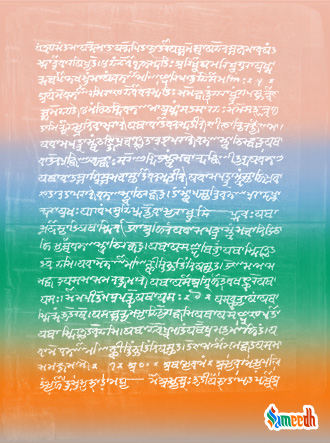Atharvaved is the latest Sanskrit Ved to have been added to the collection of Hinduism. It is one of the four sacred canonical Hindu books (sruti) known collectively as the Vedas.
Vedas, usually known as impersonal and authorless, are a few of the oldest and sacred most parts of our culture. These oldest-known Vedic Sanskrit texts originated from ancient India and are the scriptures that are used even today in some parts of the world. Unlike Ramayan and Mahabharat, which are Smritis and were written down before they were passed, Vedas are what we call Sruti or that which is heard. They were passed down from generation to generation orally before someone decided to write them down. These were usually narrated or heard by great Sages after years of intense meditation. The earliest of Vedas is credited to have been transmitted since the second millennium BCE. Atharvaved is the latest Sanskrit Veda to have been added to the collection of Hinduism. It is one of the four sacred canonical Hindu books (sruti) known collectively as the Vedas.

Ancient Layer Of Text from Atharvaveda; Image by William Dwight Whitney
Table Of Contents
Atharvaveda draws a lot of its content from its predecessor, Rigveda. It is a compilation of 730 hymns separated into 20 books, with around 6,000 mantras. Said to have been composed by a group of Rishis known as the Atharvanas, the main aim of this Veda is to highlight the religion and the culture of the Vedic period. The Atharvaveda is sometimes referred to as the “Veda of magical formulas,” a moniker that other academics dispute. It covers superstitious worry, spells to eliminate ailments believed to be caused by demons, and herbs and nature-derived potions as medicine, and is said to have been formed around the 2nd millennium BCE tradition of magico-religious ceremonies. Many of Atharvaveda Samhita’s texts are devoted to non-magical rituals and theosophy. In addition, it is a compilation of spells, prayers, charms, hymns, medical information, Ayurveda, and much more!
Around 1200 BCE – 1000 BCE, the Atharvaveda was most likely compiled as a Veda with the Samaveda and Yajurveda. The Atharvaveda has a Brahmana text, as well as a last layer of text that comprises philosophical theories, in addition to the Samhita layer (an overview of all the four Vedas). Three important Upanishads, influential to diverse schools of Hindu philosophy, are included in the second layer of Atharvaveda literature. The Mundaka Upanishad, the Mandukya Upanishad, and the Prashna Upanishad are among them.
Over the course of its twenty books, the hymns of Atharvaveda cover a wide range of topics. The first seven books, which are presumably the earliest, focus mostly on magical poems for all types of healing and sorcery. Books 8 to 12 are speculative works on many subjects, but Books 13 to 18 are mostly concerned with life cycle rites of passage ceremonies.
Cultural Importance
The Atharvaveda differs from the other three Vedas in that it does not focus solely on rauta (holy) ceremonies, but rather on the popular side of Vedic culture and religion. The Atharvaveda is a Hindu scripture. Samhita paints a fascinating picture of society in the period. The people resided in a region that stretched from Gandhara (Afghanistan) to Magadha and Anga (Bihar and Bengal). The vara system had been in place for a long time. People lived together in peace. Kings had a lot of power. Agriculture was a wealthy source of trade and commerce. At the time, farming was the primary source of income. According to certain sources, Brahmans were sometimes strong in their own right, causing them to confront the wrath of the Kshatriya monarchs. The cow was revered, and godana (cow gift) was considered extremely meritorious. The marriage institution was extremely similar to that of the Rigvedic era, with obsequious rites.
The Atharvaved is a treasure trove of Indian wisdom that can help you live a happy and prosperous life in this world.